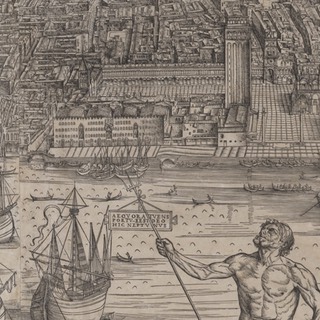
Podcast: Play in new window | Download (Duration: 29:10 — 13.5MB)
Subscribe: Google Podcasts | Spotify | Android | RSS | More
 Having moved your wheat from where it grew to where it was needed, there was a matching need to transfer the money to pay for it. Bills of exchange, invented in Venice and Genoa, created a piece of paper that increased in value as the time for delivery of the wheat drew near, but it was the need to avoid rank profiteering in times of war that created the futures market. Standard amounts of standard quality grain made buying and selling the crop even more efficient – and saved the Union army during the Civil War in the US.
Having moved your wheat from where it grew to where it was needed, there was a matching need to transfer the money to pay for it. Bills of exchange, invented in Venice and Genoa, created a piece of paper that increased in value as the time for delivery of the wheat drew near, but it was the need to avoid rank profiteering in times of war that created the futures market. Standard amounts of standard quality grain made buying and selling the crop even more efficient – and saved the Union army during the Civil War in the US.
Scott Reynolds Nelson traces the ways in which the wheat trade affected financial matters in his book Oceans of Grain. The story goes far beyond merely paying for the grain, extending to huge infrastructure projects and the consequences of their failure.
Notes
- Scott Reynolds Nelson’s book Oceans of Grain is published by Basic Books.
- In case you missed it, the first episode in this trilogy covers Grain and transport.
- There is nowfinance-transcript a transcript.
- The banner and cover images are small sections of Jacopo de’Barbara’s astonishing map of Venice, published in 1500. Trading ships were the source of Venice’s wealth, unloading grain at the Fondaco del Frumento right next to St Mark’s Square and the Doge’s Palace.

Jeremy Cherfas speaks with Scott Reynolds Nelson about his book Oceans of Grain. The conversations are broken up into the themes of transport, finance and empire. This series of conversations is not so much a history of wheat, but rather a history through wheat. It is fascinating to consider the impact that grain has had on so many significant historical events. I remember hearing Marilyn Lake talk about having a global perspective, this is a great example of this.
This summer, a polymath biologist @EatPodcast asked me tough q’s about Oceans of Grain
Prequel: Persephone’s secret eatthispodcast.com/grain-persepho…
1: Grain & Transport
eatthispodcast.com/transport-grai…
2: Grain & Finance
eatthispodcast.com/finance-grain/
3: Empire & Grain
eatthispodcast.com/empire-grain/
Thanks Jeremy for this fabulous interview
This week, @nelsonhist tells me that wheat warehouses were the first banks, like this one in Venice, how the grain futures market emerged from the US Civil War and how Russia robbed the widows and orphans of France.
eatthispodcast.com/finance-grain
This week, @nelsonhist tells me that wheat warehouses were the first banks, like this one in Venice, how the grain futures market emerged from the US Civil War and how Russia robbed the widows and orphans of France.
eatthispodcast.com/finance-grain
This week, @nelsonhist tells me that wheat warehouses were the first banks, like this one in Venice, how the grain futures market emerged from the US Civil War and how Russia robbed the widows and orphans of France.
eatthispodcast.com/finance-grain
This week, @nelshist tells me that wheat warehouses were the first banks, how the grain futures market emerged from the US Civil War and how Russia robbed the widows and orphans of France.
eatthispodcast.com/finance-grain
This week, @nelshist tells me that wheat warehouses were the first banks, how the grain futures market emerged from the US Civil War and how Russia robbed the widows and orphans of France.
eatthispodcast.com/finance-grain